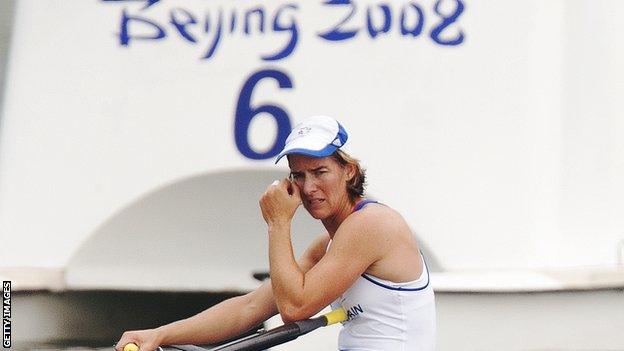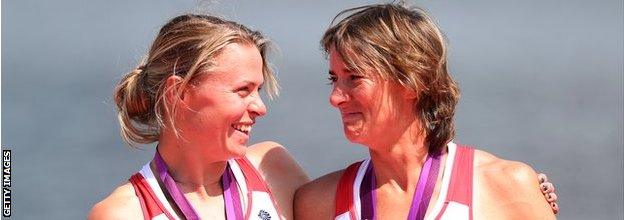Sporting Nation: Katherine Grainger's relentless drive for Olympic gold
- Published
Throughout July, BBC Scotland's Sporting Nation series is reflecting on some of the greatest feats and personalities from Scottish sporting history. Here we look at Katherine Grainger, rowing gold-medallist at London 2012 and Scotland's most decorated female Olympian.
Only a select few athletes can explain what feelings course around the body when standing on a podium with an Olympic medal around your neck. Pride? Joy? Vindication?
For Katherine Grainger, there was none of that. After dedicating 10 years to rowing, with Olympic gold her goal, describing her silver at Beijing in 2008 as a "disappointment" would be the mother of all understatements.
That medal to her was not a symbol of achievement, but failure. A glorified souvenir from the time she let her country down. She sobbed on the podium as she was given a prize that most athletes could only dream of receiving.
The issue was she already had two of them. She wanted more, wanted to be the best. Winners are greedy, and Grainger was a winner.
She considered giving up. The sport had broken her heart. But she still loved it, and she had to keep going. "Had I not won gold would I have felt unfulfilled? In a word, yes," Grainger says.

Grainger says it took "a long, long time" to get over the disappointment of being pipped to Olympic gold at the 2008 Beijing Games
Back-to-back Olympic silvers
When Grainger enrolled as a law student at The University of Edinburgh in 1993, sport was not on the agenda. She was interested in karate and the theatre, but a rowing stall at Freshers' Fair caught her eye.
Her trials to get into the senior team in her second year ended in disappointment, and she had to settle for 'social' rowing. But just six years later she represented her country at the 2000 Olympics.
The pressure of future Games was not on her shoulders in Sydney. Grainger was there to compete, but also to enjoy the experience.
Her first opening ceremony and first taste of Olympic rowing in the quadruple sculls beckoned. Great Britain had finished seventh at the World Championships a year prior, so expectation was minimal. "I think we'd have to pull out something very special to get a bronze," said the BBC's co-commentator Daniel Topolski as the race started.
They did pull out something special. They edged out Russia by one-hundredth of a second to claim silver, the first ever Olympic medal for British women's rowing.
"The colour was irrelevant, it was the medal that was the big thing," Grainger says. "Winning silver made that year for all of us. It was the most special thing in my whole life up to that point."
'You feel like you've let the whole nation down'
Come the Athens Olympics in 2004, Grainger was there to win. She was competing in the pairs and was a reigning world champion. Get it right, and they'd win.
"If it was anything other than gold, it would be tinged with a little bit of disappointment," she recalls.
It was something other, Romania pipping Grainger and Cath Bishop. Frustration was starting to grow. While she now cherishes that second silver, emotions were mixed at the time. She had to get it right in Beijing, possibly her last, best chance to become an Olympic champion.
"The project running up to Beijing was about gold," Grainger recalls. "We felt we had everything in place. We were not complacent but we were confident. We had the best chance anyone in British women's rowing ever had, but we came up against the fastest Chinese quad we had ever seen.
"It was a very fast start, we led the field and got the margin we needed. We settled into what we thought would win the race and then the last few 100m… China mounted this incredible sprint to the line that we had never seen from them before. We just couldn't match it and they beat us by a second."
As the Chinese quad celebrated, Britain's women sat in their boat, devastated. Momentarily, Grainger switched her attention to what they could do better next time, but then it hit her - there was no next time, not for another four years anyway. This was the result that would define her.
"You're so aware at the Olympics that you're competing for your country, you lose perspective," she says. "You feel like you've let the whole nation down and nothing can make that okay. Nothing can take away that pain, that sense of disappointment or that grief.
"It was genuinely grief. It took a long, long time to feel okay."
'It was all worth it for that moment we finally won'

Anna Watkins and Katherine Grainger on the podium after winning gold in the double sculls at London 2012
Grainger thought long and hard about retiring, but decided she still had more left to give. Four more years, one more Olympic cycle, one last shot at that elusive gold.
She formed a superb partnership with Anna Watkins and things looked to be shaping up for a fairy tale homecoming, with the pair unbeaten in three years prior to London 2012. They eased into the final race, and this time there was nobody was going to deny the GB pair. They dominated the field.
"Nothing and nobody could have stopped us. It was our race and nobody could take it from us," Grainger says. "I knew we couldn't get it wrong, it meant everything to us. I would have died rather than let Anna down at that point.
"To win, with that crowd, in that race, on our home course, with that person, was amazing. My previous four Olympics, every day of agony and sweat and tears - every day absolutely worth it, without question, for that moment in London when we finally won."
Pride, joy and vindication.